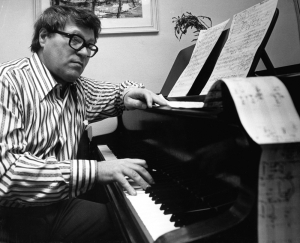The exhibition in the Moravian Library called Miloslav Ištvan – a composer who went beyond the boundaries of European music will present individual listenings of sound recordings from the composer’s work and paintings by Zuzana Novotná Ištvanová. As part of the exhibition vernissage the Miloslav Ištvan Quartet will perform and a book about his life and work will be presented.
Every month the series The Eyes of Brno (Oči Brna) introduces one of Brno’s prominent figures. November belongs to musical composer, teacher and theoretician Miloslav Ištvan (1928 – 1990). During the month-long exhibition there will also be a lecture by Ištvan’s son Radomír Ištvan, who is the author of the abovementioned book Hudební skladatel Miloslav Ištvan (život a dílo, vzpomínky a fakta) (Musical Composer Miloslav Ištvan – life and work, memories and facts). The exhibition vernissage will take place on 3 November at 5.30pm in the Moravian Library and the exhibition will be open until 28 November.
Miloslav Ištvan was born in Bystřice nad Pernštejnem and later, as a student, moved to Prague, Nové Město na Moravě and then to Brno, where he took his leaving school examination at Státní reálné gymnázium (State Secondary School). After one year of graduate studies at a conservatoire he started studying at JAMU (Janáček Academy of Music and Performing Arts) in 1948 – he specialised in composition. Not only his studies but also his educational activities at the faculty gradually formed his distinct compositional style, which culminated in the so-called method of isolated elements of music montage. He was a member of Skupina A, which was established within the Union of Czechoslovak Composers in 1963. He initiated and directed the Contemporary Music Studio between 1965 and 1966, which presented students’, as well as their teacher’s, compositions. He became a member of the Czech Music Society (Česká hudební společnost) in 1977 and a member of the Czech Composers and Concert Masters Society (Svaz českých skladatelů a koncertních umělců) one year later. He helped establish the music scholars and composers association at the beginning of the 1980s, which became known as the civil society association Camerata nova.












No comment added yet..